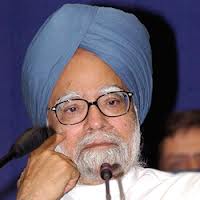
New Delhi, August 28: Declaring that allegations of impropriety in coal block allocations were baseless and unsupported by facts, Prime Minister Manmohan Singh Monday said the official auditor's report was "clearly disputable" and "flawed" because of its assumptions and computations.
Making a statement in the Lok Sabha and the Rajya Sabha on the Comptroller and Auditor General's (CAG) report that irregularities in coal block allocation resulted in presumptive losses of Rs.1.86 lakh crore ($37 billion), Manmohan Singh defended himself and his government.
"I want to assure the members that as the minister in charge, I take full responsibility for the decisions of the ministry. I wish to say that any allegations of impropriety are without basis and unsupported by the facts," he said.
He sought to read out his statement on the floor of both houses -- when they reassembled at noon after being adjourned as the Bharatiya Janata Party (BJP) kept up its demand for his resignation -- but was shouted down. Finally, he laid the statement on the table.
"The facts speak for themselves and show that the CAG's findings are flawed on multiple counts," Manmohan Singh said, tracking the history of successive governments' policies on coal blocks allocations since 1993.
The CAG had earlier this month said in its report that lack of transparency in the allocation of coal blocks to private players resulted in a loss of a whopping Rs.1.86 lakh crore ($37 billion) to the exchequer as on March 11 last year.
The prime minister noted that the CAG report was critical of the allocations mainly on three counts.
The report, he said, had stated that the screening committee that decided on allotments did not follow a transparent and objective method while making recommendations for allocation of coal blocks.
It also observed that competitive bidding could have been introduced in 2006 by amending administrative instructions instead of through a prolonged legal examination of issues, which delayed decision making.
"This premise of the CAG is flawed," he said. Finally, the CAG report mentioned the delay in introduction of competitive bidding rendered the existing process beneficial to a large number of private companies.
"According to the assumptions and computations made by the CAG, there is a financial gain of about Rs.1.86 lakh crore to private parties. The observations of the CAG are clearly disputable," he added.
Later, speaking to the media outside parliament, Manmohan Singh said he was "sorry the two houses are not (being) allowed to function and BJP is determined to disrupt normal functioning of parliament".
"I wish to assure the country that we have a strong and credible case. The observations of the CAG are disputable and they will be challenged when the matter comes before the PAC (Public Accounts Committee)," he said.
Taking credit for the UPA government conceiving competitive bidding way back in June 2004, the prime minister, in his statement, also indirectly attacked the BJP, which has been vociferously demanding his resignation.
He noted that successive governments since 1993 had followed the process of allocation of coal blocks through recommendations of inter-ministerial screening committee. The BJP-led National Democratic Alliance (NDA) under Atal Bihari Vajpayee's prime ministership was in power between 1998 and 2004.
Referring to the CAG criticism of his government for not introducing competitive bidding speedily enough, Manmohan Singh said it was "easier said than done."
"In retrospect, I would readily agree that in a world where things can be done by fiat, we could have done it faster. But, given the complexities of the process or consensus building in our parliamentary system, this is easier said than done."
"The implicit suggestion of the CAG that the government should have circumvented the legislative process through administrative instructions, over the registered objections of several state governments including those ruled by the opposition parties, if implemented would have been undemocratic and contrary to the spirit of the functioning of our federal polity," he added.
Countering the CAG report point-wise, Manmohan Singh said: "Even if we accept CAG's contention that benefits accrued to private companies, their computations can be questioned on a number of technical points."
Now that the CAG report was before the parliament and remitted to the PAC, appropriate action on the recommendations and observations contained in the report will "follow through the established parliamentary procedures", he noted.






Comments
Add new comment